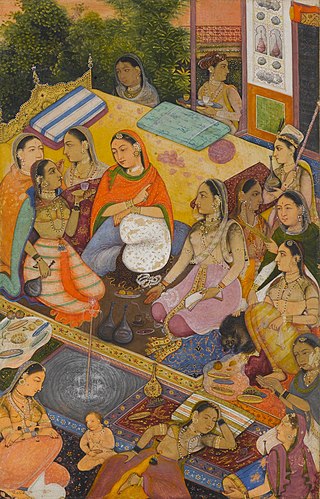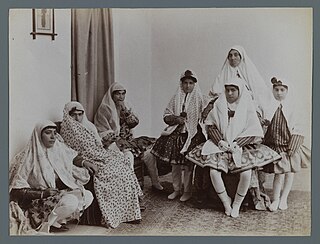Related Research Articles

The term Moor is an exonym first used by Christian Europeans to designate the Muslim populations of the Maghreb, al-Andalus, Sicily and Malta during the Middle Ages. Moors are not a single, distinct or self-defined people. The 1911 Encyclopædia Britannica observed that the term had "no real ethnological value." Europeans of the Middle Ages and the early modern period variously applied the name to Arabs, Berbers, and Muslim Europeans.

Daniel Pipes is an American former professor and commentator on foreign policy and the Middle East. He is the president of the Middle East Forum, and publisher of its Middle East Quarterly journal. His writing focuses on American foreign policy and the Middle East as well as criticism of Islamism.

Madrasa, sometimes transliterated as madrasah or madrassa, is the Arabic word for any type of educational institution, secular or religious, whether for elementary education or higher learning. In countries outside the Arab world, the word usually refers to a specific type of religious school or college for the study of the religion of Islam, though this may not be the only subject studied.

Hamza Yusuf is an American Islamic neo-traditionalist, Islamic scholar, and co-founder of Zaytuna College. He is a proponent of classical learning in Islam and has promoted Islamic sciences and classical teaching methodologies throughout the world.
Muhammad bin 'Abd ar-Rahman bin 'Obayd Allah, known as Muhammad III was an Umayyad Caliph of Cordoba in Al-Andalus.

Slavery in medieval Europe was widespread. Europe and North Africa were part of an interconnected trade network across the Mediterranean Sea, and this included slave trading. During the medieval period (500–1500), wartime captives were commonly forced into slavery. As European kingdoms transitioned to feudal societies, a different legal category of unfree persons – serfdom –began to replace slavery as the main economic and agricultural engine. Throughout medieval Europe, the perspectives and societal roles of enslaved peoples differed greatly, from some being restricted to agricultural labor to others being positioned as trusted political advisors.

Islamic feminism is a form of feminism concerned with the role of women in Islam. It aims for the full equality of all Muslims, regardless of gender, in public and private life. Islamic feminists advocate for women's rights, gender equality, and social justice grounded in an Islamic framework. Although rooted in Islam, the movement's pioneers have also utilized secular, Western, or otherwise non-Muslim feminist discourses, and have recognized the role of Islamic feminism as part of an integrated global feminist movement.

Leila Ahmed is an Egyptian-American scholar of women's studies and religion. In 1992 she published her book Women and Gender in Islam, which is regarded as a pioneering historical analysis of the position of women in Arab Muslim societies. She became the first professor of women's studies in religion at Harvard Divinity School in 1999, and has held the Victor S. Thomas Professor of Divinity chair since 2003. She was later awarded the Victor S. Thomas Research Professor of Divinity in 2020.
Khaleel Mohammed was a Guyanese-born professor of Religion at San Diego State University (SDSU), in San Diego, California, a member of Homeland Security Master's Program, and, as of January 2021, Director of SDSU's Center for Islamic and Arabic Studies.
Saba Mahmood (1961–2018) was professor of anthropology at the University of California, Berkeley. At Berkeley, she was also affiliated with the Center for Middle Eastern Studies, Institute for South Asia Studies, and the Program in Critical Theory. Her scholarly work straddled debates in anthropology and political theory, with a focus on Muslim majority societies of the Middle East and South Asia. Mahmood made major theoretical contributions to rethinking the relationship between ethics and politics, religion and secularism, freedom and submission, and reason and embodiment. Influenced by the work of Talal Asad, she wrote on issues of gender, religious politics, secularism, and Muslim and non-Muslim relations in the Middle East.
Wallada bint al-Mustakfi was an Andalusian poet and the daughter of the Umayyad Caliph Muhammad III of Córdoba.

Asma Afsaruddin is an American scholar of Islamic studies and Professor in the Department of Near Eastern Languages and Cultures at Indiana University in Bloomington.

Aaron W. Hughes is a Canadian academic in the field of religious studies and history. He holds the Dean's Professor of the Humanities and is the Philip S. Bernstein Professor in the Department of Religion and Classics at the University of Rochester. He was the Gordon and Gretchen Gross Professor at the University at Buffalo, State University of New York from 2009 to 2012, and, from 2001 to 2009, professor of religious studies at the University of Calgary in Alberta, Canada.
Asifa Bano Quraishi is an American educator and legal scholar. She is a professor of law at the University of Wisconsin-Madison, where she teaches courses in Islamic law and U.S. constitutional law. She has served as a law clerk in United States federal courts. Her recent publications address issues of Islamic constitutionalism, in the context of separation of legal authority as well as methodologies of textual interpretation. Quraishi has also written articles for news outlets like The Washington Post and Middle East Eye addressing myths and issues associated with Islam.

Women's history is the study of the role that women have played in history and the methods required to do so. It includes the study of the history of the growth of women's rights throughout recorded history, personal achievements over a period of time, the examination of individual and groups of women of historical significance, and the effect that historical events have had on women. Inherent in the study of women's history is the belief that more traditional recordings of history have minimised or ignored the contributions of women to different fields and the effect that historical events had on women as a whole; in this respect, women's history is often a form of historical revisionism, seeking to challenge or expand the traditional historical consensus.
White feminism is a term which is used to describe expressions of feminism which are perceived as focusing on white women while failing to address the existence of distinct forms of oppression faced by ethnic minority women and women lacking other privileges. Whiteness is crucial in structuring the lived experiences of white women across a variety of contexts. The term has been used to label and criticize theories that are perceived as focusing solely on gender-based inequality. Primarily used as a derogatory label, "white feminism" is typically used to reproach a perceived failure to acknowledge and integrate the intersection of other identity attributes into a broader movement which struggles for equality on more than one front. In white feminism, the oppression of women is analyzed through a single-axis framework, consequently erasing the identity and experiences of ethnic minority women in the space. The term has also been used to refer to feminist theories perceived to focus more specifically on the experience of white, cisgender, heterosexual, able-bodied women, and in which the experiences of women without these characteristics are excluded or marginalized. This criticism has predominantly been leveled against the first waves of feminism which were seen as centered around the empowerment of white middle-class women in Western societies.

Concubinage in the Muslim world was the practice of Muslim men entering into intimate relationships without marriage, with enslaved women, though in rare, exceptional cases, sometimes with free women. If the concubine gave birth to a child, she attained a higher status known as umm al-walad.
Maya Shatzmiller is a historian whose scholarship focusses on the economic history of the Muslim world. She became a Fellow of the Royal Society of Canada in 2003. She received her PhD from the University of Provence in 1973, and was a visiting scholar at the Institute for Advanced Study in 1992. Shatzmiller is a professor of history at the University of Western Ontario.
Shenila Khoja-Moolji is the Hamad bin Khalifa al-Thani Endowed Chair of Muslim Societies and an Associate Professor at Georgetown University. She is a Shia Ismaili Muslim scholar known for her scholarship on Muslims, gender, and Pakistan studies.
References
- 1 2 3 "Smith College Announces the Promotion of Four Women to Full Professor". Women In Academia Report. 2021-03-04. Retrieved 2022-06-03.
- 1 2 "Women in Islam: Behind the veil and in front of it". Deutsche Welle. 2016-10-01. Retrieved 2022-06-03.
- ↑ "Ibtissam Bouachrine". Smith College. Retrieved 2022-06-03.
- ↑ Annual Report. By David Rockefeller Center for Latin American Studies · Publisher The Center, 2005. United States,
- 1 2 "The Institute for Rebooting Social Media announces its inaugural cohort of visiting scholars". Harvard Law Today. April 8, 2022. Retrieved 2022-06-03.
- ↑ "The Journal of the Middle East and Africa Editorial Board". www.tandfonline.com. Retrieved 2022-06-03.
- 1 2 Bouachrine, Ibtissam (2014). Women and Islam: Myths, Apologies, and the Limits of Feminist Critique. Lexington Books. p. 127. ISBN 978-0-7391-7906-2.